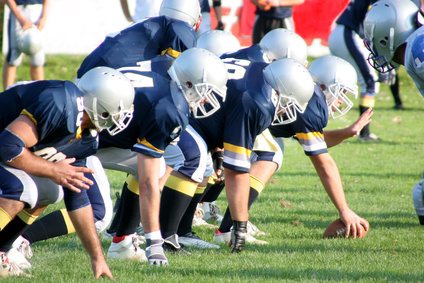
NCAA FACING MULTIPLE CONCUSSION RELATED LAWSUITS

In the wake of the NFL’s $765 million concussion lawsuit settlement, the NCAA looks to be faced with a similar legal battle. The number of concussion-related lawsuits filed against the governing body for collegiate athletics moved to five last week when attorneys for former Kansas fullback Chris Powell filed suit in U.S. District Court in Western Missouri. The longest running of the five suits, filed in 2011 by former Michigan wide receiver Adrian Arrington, is currently in mediation.
The five lawsuits similarly allege that the NCAA lacked policies to protect and care for student athletes who suffered concussions or other head injuries, and also that it failed to educate student athletes about the potential consequences of brain injuries.
According to documents filed in the litigation, there were more than 29,000 concussions in NCAA-sanctioned sports between 2004 and 2009 – with the majority occurring in football. A recently as 2010, the NCAA didn’t have any stated concussion protocol for member schools to follow. In 2011, the NCAA required all schools to develop concussion management plans to outline how injured athletes should be evaluated, treated, managed, and allowed to return to play. Despite this requirement, individual schools were left to develop plans on their own and there was little, if any, oversight from the NCAA. In fact, NCAA medical director David Klossner admitted that the organization has largely failed to monitor whether schools have implemented concussion management plans and not a single NCAA member school has been sanctioned for failing to institute a plan to date.
Although the NFL settled its concussion lawsuit for hundreds of millions of dollars there were actually some mitigating factors that reduced the NFL’s liability in that suit. The same cannot be said for the NCAA as most would agree it owes a higher duty of care to student athletes than the NFL does to its players. For example, most of the plaintiffs in the NFL lawsuit were covered under a collective bargaining agreement negotiated on their behalf by the NFL Players Association. NCAA players have no such protection. Not to mention, NFL players are well compensated for their services and thus concussions are arguably a known job hazard. NCAA players on the other hand are not paid despite the NCAA profiting handsomely from their revenues, especially in college football. These realities make it more likely that the NCAA breached a duty of care it owed to college athletes and thus more likely that the NCAA will be making a large payout to former players in the near future.
The size of that payout will largely depend upon how many plaintiffs are involved in the suit. All suits filed thus far are seeking class action certification, but before any of the suits can proceed as a class action, the presiding judge must certify the class. The plaintiffs are seeking to define the class as “all former NCAA football players who sustained a concussion(s) or suffered concussion-like symptoms while playing football at an NCAA school, and who have, since ending their NCAA careers, developed chronic headaches, chronic dizziness or dementia or Alzheimer’s disease and/or other physical and mental problems as a result of the concussion(s) suffered while a player.”
Personal Injury attorneys at Dolman Law Group are experienced and aggressive Florida traumatic brain injury attorneys who are often called upon by their colleagues to co-counsel head injury cases throughout the State of Florida. If our injury law attorneys can be of any further assistance, do not hesitate to call us immediately for a free case evaluation and consultation. 727-451-6900. Please visit our website to learn more about Traumatic Brain Injury http://www.dolmanlaw.com/practice-area/brain-injury/
Google+




